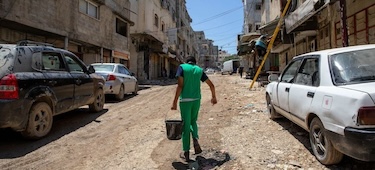By Thalif Deen
UNITED NATIONS | 20 August 2024 (IDN) — The rising death toll of humanitarian workers in war zones has prompted over 400 civil society and humanitarian organizations, plus several UN agencies, to denounce the horrifying killings of civilians.
A joint letter addressed to the 193 Member States of the UN General Assembly urges the international community to help end attacks on civilians, protect all aid workers, and hold perpetrators to account.
On World Humanitarian Day, which was commemorated on August 19 “our staff and volunteers around the world will stand in solidarity to spotlight the horrifying toll of armed conflicts on their colleagues and on all civilians, particularly children.”
“The brutal hostilities we are seeing in multiple conflicts around the world have exposed a terrible truth: We are living in an era of impunity. Attacks that kill or injure civilians, including humanitarian and health-care personnel, are devastatingly common.
Yet despite widespread condemnation, serious violations of the rules of war too often go unpunished. This status quo is shameful and cannot continue.”
In 2023, tens of thousands of civilians were killed or injured in armed conflict, with fatalities among humanitarian workers doubling compared to the previous year.
The toll in 2024—the number of deaths, injuries, detentions and kidnappings – is already staggering. The overwhelming majority of recorded attacks on aid workers are inflicted on national staff. Women-led organizations and female humanitarian staff face unique and often increased risks, just because they are women.
The impact on the mental health of civilians and humanitarian workers has reached unprecedented levels. And yet parties to conflict continue to flout laws meant to protect civilians, including humanitarian workers, and civilian objects.
With 280 aid workers killed in 33 countries last year, 2023 was the deadliest year on record for the global humanitarian community, according to the UN Office for the Coordination of Humanitarian Affairs (UNOCHA).
“This outrageously high number represents a 137 per cent increase compared to 2022, when 118 aid workers were killed. More than half of the 2023 deaths were recorded in the first three months—October to December—of the hostilities in Gaza, mostly as a result of airstrikes.
The Open Letter to member states, was sent on behalf of the Inter-Agency Standing Committee (IASC), the highest-level humanitarian coordination forum of the United Nations system.
The Committee brings together the executive heads of 19 organizations and consortia to formulate policy, set strategic priorities and mobilize resources in response to humanitarian crises.
The signatories to the letter include CARE International, ActionAid, Oxfam, Action Against Hunger, International Organization for Migration, the UN children’s agency (UNICEF) and the International Committee of the Red Cross and Red Crescent, amongst others.

And as of 7 August, 172 aid workers had been killed this year. That’s according to a provisional count from the Aid Worker Security Database.
In its appeal, the 400-plus organizations call on all States, parties to armed conflict, and the wider international community to:
- End attacks on civilians and take active steps to protect them—and the critical civilian infrastructure they rely on.
- Protect all aid workers, including local and national actors, and their premises and assets and facilitate their work, as called for in UN Security Council Resolution 2730 adopted this May.
- Hold perpetrators to account. Those who commit violations of International Humanitarian Law (IHL) cannot go unpunished.
“We should not have to wait for an annual moment such as World Humanitarian Day to remind all parties to armed conflict, and all States, of their obligations under IHL. Adherence to IHL must happen every day irrespective of occasion. It is non-negotiable and is not subject to exceptions.
It is vital that all parties to armed conflict and all States adhere to their obligations and leverage their influence to ensure respect for the rules of war and minimize human suffering.”
Fulfilling these obligations, says the letter, requires more than mere declarations – it demands immediate and decisive actions. Turning a blind eye when humanitarian workers are targeted only emboldens those who seek to hinder their work.
This only serves to increase food insecurity, childhood malnutrition, involuntary displacement and the spread of infectious diseases and other threats. The immediate effects of these will not only be limited to areas of conflict but often spread far beyond.
We will continue to stay and deliver in humanitarian crises around the world – but the situation requires us to take a united stand to call for the protection of our staff, volunteers and the civilians we serve”. [IDN-InDepthNews]
Photo: A person carries water through the streets in a West Bank town. The situation there is gradually worsening. Credit: UNRWA


